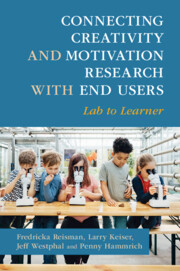Book contents
- Connecting Creativity and Motivation Research with End Users
- Connecting Creativity and Motivation Research with End Users
- Copyright page
- Dedication
- Contents
- Figures and Tables
- Modules
- Boxes
- Preface
- Acknowledgments
- Chapter 1 Translational Education Research
- Chapter 2 Creativity
- Chapter 3 Motivation
- Chapter 4 Assessment Attributes and Related Guidelines
- Chapter 5 Assessment of Creativity
- Chapter 6 Assessment of Motivation
- Chapter 7 Additional Theorists on Creativity and Motivation
- Chapter 8 Neuroscience of Creativity, Mindfulness, and Mind/Brain/Education Science
- Chapter 9 Creativity Modules
- Chapter 10 Motivation Modules
- Chapter 11 Dissemination and Communication Techniques for Translational Research
- Chapter 12 From Individual Compliance to Creative Collaboration: A Business Perspective
- Index
- References
Chapter 3 - Motivation
Published online by Cambridge University Press: 08 February 2024
- Connecting Creativity and Motivation Research with End Users
- Connecting Creativity and Motivation Research with End Users
- Copyright page
- Dedication
- Contents
- Figures and Tables
- Modules
- Boxes
- Preface
- Acknowledgments
- Chapter 1 Translational Education Research
- Chapter 2 Creativity
- Chapter 3 Motivation
- Chapter 4 Assessment Attributes and Related Guidelines
- Chapter 5 Assessment of Creativity
- Chapter 6 Assessment of Motivation
- Chapter 7 Additional Theorists on Creativity and Motivation
- Chapter 8 Neuroscience of Creativity, Mindfulness, and Mind/Brain/Education Science
- Chapter 9 Creativity Modules
- Chapter 10 Motivation Modules
- Chapter 11 Dissemination and Communication Techniques for Translational Research
- Chapter 12 From Individual Compliance to Creative Collaboration: A Business Perspective
- Index
- References
Summary
This chapter addresses motivation by sharing the ideas of leading motivation researchers. These include Maslow’s hierarchy of needs, Herzberg’s two-factor motivation–hygiene theory, Alderfer’s ERG, and a more recent theory of needs proposed by Richard Ryan and Edward Deci: the self-determination theory of motivation. Other theories presented include Victor Vroom’s expectancy theory, McClelland’s achievement theory, Merton’s term self-fulfilling prophecy, and Locke and Latham’s and Porter and Lawler’s goal-setting theory. Also included are elements of motivation, processes of motivation, types of motivation, and the neuroscience of motivation. Appendix 3A is a glossary.
Keywords
- Type
- Chapter
- Information
- Connecting Creativity and Motivation Research with End UsersLab to Learner, pp. 60 - 79Publisher: Cambridge University PressPrint publication year: 2024

